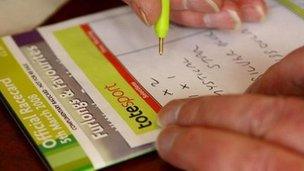Laws on gambling outdated, say MPs
- Published

Gambling laws are "outdated" and "ill-equipped" to deal with social and technological changes, MPs have said.
The Commons culture committee has urged further deregulation of the gaming and betting industries in recognition of the "global" nature of gambling.
Casinos should be able to relocate more easily while betting shops could be allowed more slot machines, it said.
But the MPs also called for specific research into the risks of problem gambling among children.
Rules to protect vulnerable groups should be rigorously enforced, it stressed.
Publishing a report into the UK's gambling laws, the cross-party committee said the 2005 Gambling Act - which sought to liberalise the industry - had resulted in "numerous inconsistencies".
The legislation, which came into force in 2007, relaxed some of the regulations surrounding gambling, including restrictions on betting shops, casinos and online gambling operators advertising on TV.
Critics of the bill feared it would increase cases of problem gambling and the bill was diluted to reduce the number of new regional "super casinos" awarded licences to one, and smaller casinos to 16.
'Betting clusters'
The MPs said the row over casino expansion at the time demonstrated that decisions over whether new licences should be approved should be taken by local authorities, not by "central diktat".
The committee said restrictions should be lifted to allow operators to relocate outlets to new areas if they have council backing.
The report also says limits on the number of gaming machines in High Street betting stores may have unintentionally led to multiple bookmakers opening next to each other to "satisfy customer demand".
It recommends bookmakers be allowed to have more than four machines in each store with stakes of up to £100 and a £500 prize, if it can be shown to reduce "clustering" of betting stores.
Among other recommendations are:
Up to 20 high-stakes gaming machines allowed in casinos with most strict access rules
Online gambling taxes set at "correct level" to encourage offshore firms to return to UK
Lower licence fees for independent bookmakers
A new public information campaign on problem gambling
Review of Gambling Commission's budget to reduce overheads
John Whittingdale, the Conservative MP who chairs the committee, said his colleagues supported further liberalisation where appropriate and decisions being taken at a local level rather than by central government or by regulators.
"While we recognise the need to be aware of the harm caused by problem gambling, we believe there is considerable scope to reduce and simplify the current burden of regulation," he said.
"The 'reluctantly permissive' tone of gambling legislation over the last 50 years now looks outdated.
"It is also inadequate to cope with the realities of the global market in online gambling, and even seems ill-equipped to cope with the realities on our High Streets."
Mecca Bingo welcomes more changes to gambling laws
Appearing before the committee last year, Culture Secretary Jeremy Hunt acknowledged gambling laws were "inconsistent" and policy was "in limbo" in certain areas.
But he ruled out any imminent changes amid concerns over how best to tackle the issue of addiction.
The casino industry said modest changes to existing regulation, such as "harmonising" the number and type of gambling products, could increase jobs and tax returns without any new outlets opening.
"The availability of gambling on the internet now renders many of the restrictions on land-based casinos irrelevant," said Malcolm Moss, chair of the National Casino Industry Forum.
"We welcome the committee's endorsement that our casinos provide the safest places for gambling and therefore now deserve to offer the widest product choice."
Anti-gambling campaigners have said they are against further expansion.
Jake Brindell, a former gambling addict who now runs a website to help people with their problems, says the gaming industry and Treasury would see an increase in their "coffers" but problem gamblers would "suffer".
He added: "Who's going to pay for most of that? It's the person on the High Street.
"The more opportunities people have got to gamble, the more people are going to gamble."
- Published27 October 2011